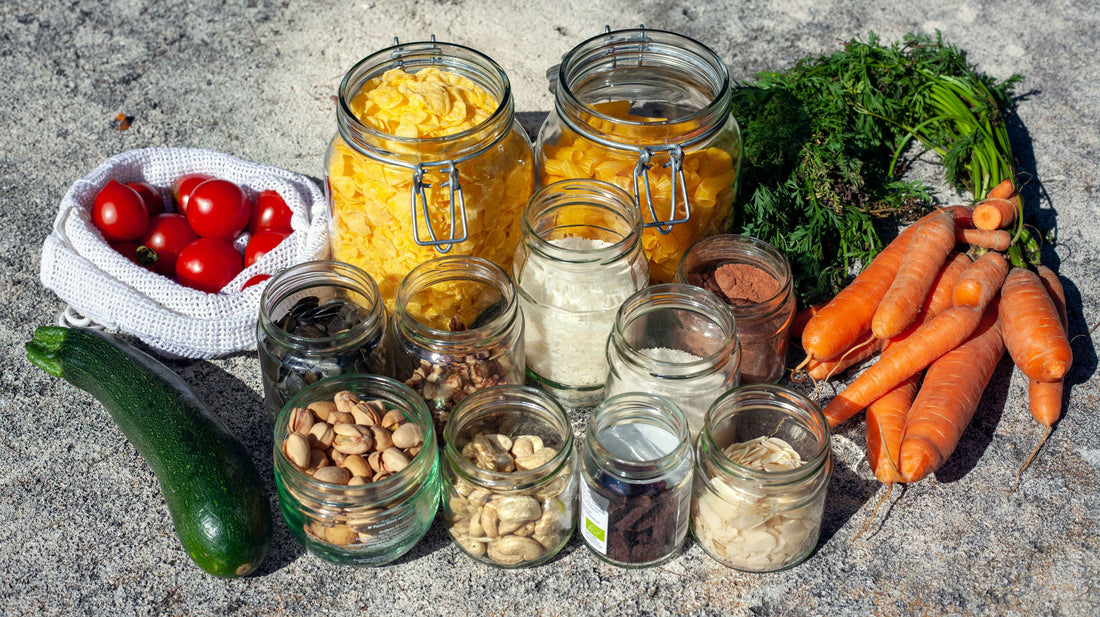Boost Your Immune System with Powerful Prebiotic Foods

Prebiotic foods play a crucial role in maintaining optimal gut health and overall well-being. These dietary fibers serve as nourishment for the beneficial bacteria residing in our gastrointestinal tract, promoting their growth, activity, and overall health.
In this blog post, we will explore the significance of prebiotics and their role in promoting beneficial gut bacteria, enhancing immune system performance, reducing inflammation, and potentially improving calcium absorption.
Moreover, we'll investigate certain foods that are high in prebiotic ingredients, such as dandelion greens, garlic, lentils, and chicory root.
What Are Prebiotics?
Prebiotics are a type of dietary fiber that promotes the growth of good bacteria in your body. Good bacteria help the body produce essential nutrients that boost your digestive system and minimize harmful bacteria in your gut. (1)
Prebiotic foods also help feed probiotic microorganisms that are known to promote health.
Numerous prebiotics exist, with many coming from foods rich in specific carbohydrates like oligosaccharides, which are found in foods such as cereals, vegetables, and fruit. (2)
By consuming prebiotics, we help maintain a balanced microbial environment in the gut that supports healthy digestion and overall well-being.
Prebiotic foods have also been shown to improve metabolic health and even help prevent certain diseases.
Are Prebiotics and Probiotics the Same?
Despite how similar the two words sound, prebiotics and probiotics are not the same.
Prebiotics provide nourishment for healthy bacteria, whereas probiotics are live microorganisms that can be found in fermented foods like yogurt, kefir, and sauerkraut.
Both prebiotics and probiotics are important for maintaining a healthy gut microbiota.
Role of Prebiotics in Promoting Good Gut Bacteria
People with poor gut health may face a variety of health issues.
From bloating and constipation to high blood sugar levels and more serious illnesses.
When you consume fiber-rich foods containing prebiotic ingredients, these fibers pass through the small intestine undigested and reach the large intestine, where they serve as food for probiotics—the friendly (good) bacteria.
Fermented foods such as yogurt and kimchi contain live cultures that also contribute to maintaining bacterial balance. However, it is important not to confuse them with prebiotics. Instead, they are complementary components, supporting each other’s functions within the gut microbiota ecosystem.
Benefits of Prebiotic Food Sources for Your Immune System
Prebiotic foods support a healthy gut microbiome by promoting the growth of good bacteria. This can improve digestion, enhance immune function, reduce inflammation, and potentially increase calcium absorption.
A diet rich in prebiotic foods has been shown to support digestive health by encouraging the production of short-chain fatty acids (SCFAs).
SCFAs have anti-inflammatory properties that can help alleviate symptoms associated with various inflammatory conditions like irritable bowel syndrome (IBS) or Crohn's disease while also strengthening our immune response against harmful pathogens entering the gastrointestinal tract. (3)
Research has also indicated that prebiotics can modulate the immune system by promoting the growth of beneficial bacteria, which in turn produce nutrients like butyrate—a compound known to suppress inflammation and improve gut barrier function. (4)
Prebiotics for Bone Health
An increasing amount of evidence supports the positive effects of prebiotics on bone health and calcium metabolism. (5) Dietary fibers have been shown to enhance calcium absorption in the lower intestines.
Maintaining strong bones can help reduce the risk of bone fractures and osteoporosis.
Calcium Absorption
Several studies have suggested that consuming prebiotic foods may enhance calcium absorption. Certain types of prebiotic fibers, such as inulin and fructooligosaccharides (FOS), increase the solubility of minerals like calcium, making them more readily available for absorption into the bloodstream.
A study published in The Journal of Nutrition found that adolescents who consumed 8 grams of chicory root-derived inulin daily experienced significantly higher levels of calcium absorption compared to those receiving a placebo. These findings suggest that incorporating prebiotic-rich foods into your balanced diet could potentially contribute to better bone health over time.

12 of the Best Prebiotic Foods
1: Dandelion Greens
Dandelion greens are packed with vitamins A and K and contain around 4 grams of dietary fiber per 100-gram serving. This makes them an excellent source for nourishing healthy bacteria within the large intestine.
2: Garlic
Garlic is well-known for its antimicrobial properties, but it is also rich in prebiotic fibers like inulin and fructooligosaccharides (FOS). About 11% of garlic's fiber content comes from these prebiotics, which promote the growth of beneficial gut bacteria like Bifidobacteria and Lactobacilli.
3: Chicory Root
Chicory root has been used for generations as both a coffee substitute and a medicinal remedy. It is rich in antioxidants and prebiotic fibers, particularly inulin and FOS.
4: Onions
Rich in antioxidants and dietary fibers, including FOS, raw consumption is recommended for maximum benefit.
5: Jerusalem Artichokes
Also known as sunchokes, these tubers contain high levels of inulin, making them a great prebiotic food choice.
6: Bananas
While not as high in prebiotics as some other foods on this list, bananas are still a good source of dietary fiber and make for an easy snack or breakfast addition.
7: Whole Oats
8: Apples
9: Leeks
10: Konjac Root
11: Flaxseeds
Flaxseed is well known as a good source of prebiotics that encourage regular bowel movements and reduce the amount of dietary fat absorbed daily.
Flaxseeds also have anticancer and antioxidant properties, which can help regulate blood sugar levels. (6)
12: Whole Oats
Whole oats are high in fiber, beta glucan fiber, resistant starch, and soluble fiber—all of which are linked to the promotion of healthy bacteria. (7)
Oats are known to support digestion, control blood sugar, and reduce cholesterol.
Suggested Reading: 11 Great Tasting Recipes for Kids
Extra Ideas for Incorporating Prebiotics Into Your Diet
In addition to the best prebiotic food sources mentioned above, here are a few more tips for incorporating prebiotics into your diet.
Garlic's Versatility in Cooking Various Dishes
Garlic provides not only antimicrobial properties but also an abundance of prebiotics. Its strong flavor makes it easy to include in many recipes.
Use minced garlic in pasta sauces, stir-fries, soups, and stews for both flavor enhancement and gut health benefits.
Consider creating a tasty salad dressing by combining crushed garlic cloves with olive oil, lemon juice, salt, and pepper. This will help improve digestive health while allowing you to enjoy fresh vegetables.
Roast whole garlic cloves and spread them on whole-grain toast or crackers for a fiber-rich snack.

Replacing Coffee with Chicory Root Tea
Chicory root has a coffee-like flavor, is high in antioxidants, and contains beneficial compounds like inulin and FOS. Sweeten your chicory root tea with honey or stevia if needed—but remember that it already has a naturally sweet taste.
By replacing your daily cup of coffee with chicory root tea, you can enjoy its prebiotic benefits.
Include Raw Onions in Your Diet
Raw onions are an excellent source of prebiotics, flavonoids, and antioxidants—compounds that may help prevent cancer.
Beta Glucan as a Prebiotic
Beta glucan, a natural polysaccharide, falls under the category of Immuno-Modulators, implying that it alters the Immune System to optimize its efficiency.
This molecule, resembling a fiber, functions by stimulating various types of Immune System Cells within the body, including Macrophages, Neutrophils, Basophils, and Natural Killer Cells.
Beta glucan (β-glucan) is expected to be a potential prebiotic for the modulation of gut microbiota. (8)

How Beta Glucan Works
Glucan activates innate immune cells, which in turn trigger adaptive immune cell responses, potentially helping to strengthen the immune system.
When the body encounters foreign pathogens recognized as non-self, beta glucan triggers a heightened state of readiness in the immune cells, preparing them to confront the invaders.
The effectiveness of immune cells, known as immunocytes, determines the capability of our immune system to capture and eliminate intruders that should not be present within the body.
Suggested Reading: Benefits of Beta Glucan
Beta Glucan Can Work as a Prebiotic
A thorough study tested how glucans affect the growth of nine specific probiotic strains of Lactobacillus, Bifidobacterium, and Enterococcus, which showed positive prebiotic activities. (9)
While many foods contain substances with prebiotic properties, it is important to note that no food itself can be classified as a prebiotic. (10)
In essence, beta glucan acts as a catalyst, enhancing the intelligence of our immune system and bolstering the strength of our defense mechanisms. It is not unexpected that scientists widely agree that beta glucans are categorized as prebiotics. (11)
Conclusion
Including prebiotic-rich foods in one's diet is a must for keeping the digestive system functioning optimally, as they offer essential dietary fiber and vital nutrients.
To improve digestive health, consuming fiber-rich foods that produce short-chain fatty acids in the large intestine is important. These fatty acids support the growth of healthy bacteria in the gut microbiota. Some examples of fiber-rich foods include wheat bran, oats, and fruits and vegetables.
Still have questions?
Our ACES Team is always there to help.









